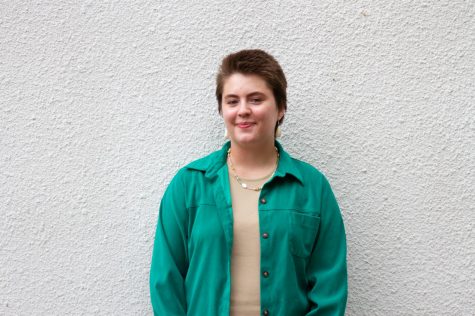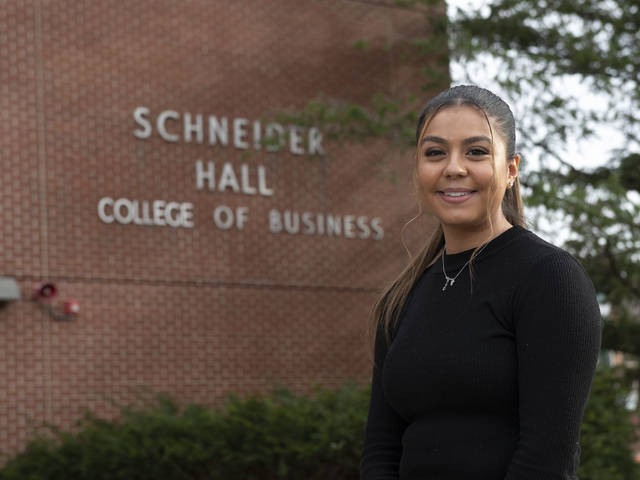Through the voice of others, she found her own
Alejandra Serna, McNair Program student, finds her path through qualitative research project
Photo by SUBMITTED
Alejandra Serna, said she has experienced a lack of representation first-hand at UW-Eau Claire. Her research project, “A Walk in Her Shoes: How Women of Color Navigate a Predominantly White Institution,” aims to raise awareness of student voices on campus.
Alejandra Serna, a fourth-year business administration student, began a research project with one mission: to vocalize a lack of equity, diversity and inclusion on the UW-Eau Claire campus.
“I really want to have implications and suggestions on how our campus can do better,” Serna said. “I think that we can do better. I think that we are doing a wonderful job at wanting to make EDI more aware — but we have a lack of representation.”
Serna’s research proposal, “A Walk in Her Shoes: How Women of Color Navigate a Predominantly White Institution,” is in collaboration with the Ronald E. McNair Program — an on-campus achievement program designed for first-generation and minority students to propel their pursuit of graduate school.
As an incoming student at UW-Eau Claire, Serna said she experienced a lack of representation first-hand, as she struggled with finding her place as an intersectional student and woman of color.
“Being a woman of color at UW Eau Claire — we’ve gone through a lot of barriers and challenges that no one really knows about until we really speak about it,” Serna said. “I really wanted to leave an impact on incoming women of color that really struggled like I did. Just so they know that they’re not alone, because I thought I was alone.”
This critical issue is what gave her the inspiration to research something personal to her values, she said.
Kelly Wonder, director of the McNair Program at UW-Eau Claire, said she has grown a deep connection with Serna and enjoys seeing her develop into her most authentic self — through Serna’s research.
“She just brings such a unique perspective to the table,” Wonder said. “She took on this topic because it also helped her understand her own journey and her own experience as an undergraduate. By part of hearing the voices of others, she found a sense of her own voice.”
Serna first began her research by focusing on a primary student demographic: Black and Latina women on the UW-Eau Claire campus. After several months of collecting participants from all walks of life, she was able to sit down with each one and hear their authentic story, Serna said.
“I wanted to do a smaller amount of [participant] numbers and really get to know the stories of each individual,” Serna said. “I feel an emotional bond with them — I’m so thankful for hearing their stories and without them, (my research) wouldn’t have been possible.”
Through her testimonies with each survey participant, she asked a variety of questions related to the student’s on-campus experience and upbringing. A portion of the questions she asked are listed below:
- How would you describe your hometown environment?
- Can you tell me about yourself (as a woman of color)?
- How has your experience on campus been so far (as a woman of color)?
Wonder said she applauds Serna for her intense drive and motivation to share a story of diversity — through a research method that is unique for her education pathway.
“People underestimate the power of a qualitative research project and really hear the voice of their participants,” Wonder said. “Alejandra is a business major and to have someone from a business background take this social sciences qualitative study, I think is also really great. You learn how to look at things differently.”
Serna said her biggest revelation through her research was how impactful a person of color’s upbringing is on their tolerances and struggles as a post-secondary student.
Without knowing any of the backgrounds of her female counterparts, she was struck by the divide between upbringings in a predominantly white environment versus not, Serna said.
“Everyone who grew up in a white environment has had similar patterns — rejecting their culture, they didn’t want to be different,” Serna said. “The (students) that came from diverse environments, those were the ones that experienced culture shock — who struggled to find themselves.”
In her final year as a student at UW-Eau Claire, Serna has presented portions of her research project to the McNair symposium and will continue to develop her qualitative results until she graduates in the spring of 2021.
While Wonder has worked alongside Serna for the last year, Wonder said hopes to see her continue down a bath of advocating for student voices in higher education.
“I would really love to see her work her way into a vice chancellor of equity, diversity and inclusivity role,” Wonder said. I think she has such a passion for the cause, as well as the personal experience and can really be a role model for students on so many different levels.”
Serna said at the end of the day, she hopes to make a difference in the attention brought to equity, diversity and inclusion on campus.
“I experienced racism. I experienced microaggressions. I wanted to transfer so many times from UW-Eau Claire because of those things,” Serna said. “Instead of transferring, I really wanted to change my story — change my experience. I wanted to do better for myself and for other students of color.”
More information on “A Walk in Her Shoes: How Women of Color Navigate a Predominantly White Institution,” can be found through Serna at sernaa4798@uwec.edu.
Nelson can be reached at nelsoner1654@uwec.edu.

Evelyn Nelson is a third-year Journalism and Environment, Society and Culture student. This is her fifth semester on The Spectator. She enjoys fulfilling her dream of being a barista, at SHIFT Cyclery and Coffee Bar. Stop by for some great coffee and conversation!


